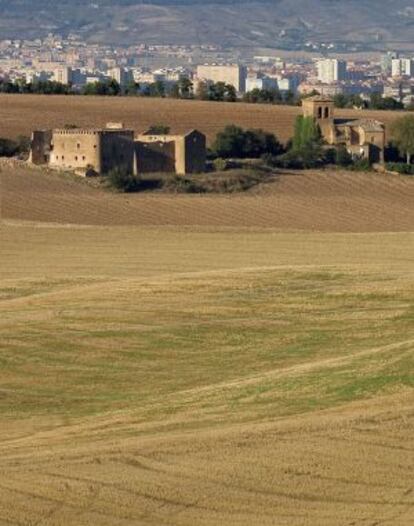Why the crisis could be good for nature
Environmentalists wage legal campaign to reverse earmarking of land for building


Development madness turned Spain into the European country that created the most urban land between 2000 and 2006, according to a recent study by the European Environmental Agency (EEA). A series of satellite images show that over this period, Spain accounted for 24 percent of all newly developed land in the European Union, followed by France with 12 percent and Germany with nine percent.
The subsequent economic crisis has served to slow down this trend, benefiting green areas and arable land, as well as some of the animal and plant species that live in them. But the real estate bubble has left behind enough land already classified as available to build on to last the next 35 to 40 years at an average annual pace of around 150,000 new housing units, according to the Public Works Ministry's Urban Information System.
That means there are 709,577 hectares of land that could still be rescued and returned to nature.
It is this great pocket of land that environmentalists want to win back by having it reclassified as green space once more, at least in cases where construction is not imminent. It will not be easy because money, or the promise of it, is at stake.
Owners had not lost hope that this land would be rezoned as fit for building"
"That zoned land has a market value. It has been placed together with the toxic assets, and reversing this situation would generate a very notable loss of value," explains Rafael Mata Olmo, chair of the Geography and Land Zoning Department at Madrid's Aut¨®noma University. It could not be done simply by pointing out the non-existent chances of development in the near future, or by noting the significant environmental value of the spot. The process, a slow one, would in many cases require arbitration by the courts.
Seo BirdLife members still remember how they tried to purchase agricultural land in Alcal¨¢ de Henares (Madrid province) with a view to encouraging the recovery of the lesser kestrel. It was an impossible task.
"The owners had not lost hope that this land would be rezoned as fit for building, which would bring them greater benefits," explains Juan Carlos Atienza. But this conservation group, which is extremely active in the courts, says it has detected "a certain degree of juridical interest" in reviewing the status of for-building land.
"We have been requesting for land to be preserved, and generally this is granted," says Atienza. This non-profit has also asked political parties to include a clause in the country's Land Law stipulating that any property classified as fit for building must revert back to its previous state if construction does not occur within 10 years.
"Our lifestyle, associated with large-scale consumerism, is putting pressure on the earth," says Hans Bruyninckx of the EEA. And there is another effect beyond all the square meters of cement: roads and other associated infrastructure are progressively eroding valuable habitats, with terrible consequences for some of Europe's most endangered species.
Our lifestyle, associated with large-scale consumerism, is putting pressure on the earth"
In the case of Spain, urban land has chiefly taken over agricultural areas. The regions most affected by this artificial occupation are Madrid, the Mediterranean coast (Alicante, Valencia, Murcia, the Balearic Islands and most especially Castell¨®n), strategic parts of Zaragoza, areas near population centers such as Toledo and cities that used to have small populations, such as Ourense or Valladolid.
Untrammeled development has also invaded areas that are prone to flooding - riverbeds and beachfronts - worsening the effects of natural disasters.
"The Land Law of 1998, approved by the Popular Party (PP), did not clearly specify that you could not build in areas affected by natural risks," says Jonathan G¨®mez Cantero, a climatologist specializing in natural risk areas. "Now there is not a single Mediterranean municipality that has not built along a watercourse, and that greatly increases people's vulnerability," he adds.
Good city planning does not completely prevent flooding, but it can prevent it from turning into a catastrophe. G¨®mez Cantero illustrates his point with the latest flooding in the Pyrenees, which has the added risk of landslides. "In Castro Urdiales (Cantabria), there was a residential development right by the sea that was being marketed under the slogan 'you'll get splashed by the waves.' I find that incredible," he laments. Many properties are now set to benefit from a government amnesty for beachfront developments.
In 2004, Spain built as many as 600,000 homes - more than Germany, France and Italy. "There was no limit to growth," explains Sebasti¨¢n Grau, president of the Spanish Association of Planning Technicians. Now things are different. The sector's efforts are focusing on renovation, on making cities grow inward rather than outward. In June, the government approved an urban renovation and regeneration law that states it is "very difficult" for the construction and real estate sectors to continue developing pristine land in the short to medium term. There are currently 723,043 housing units lying empty.
The great challenge now is to regenerate the land. While builders keep waiting for better years to come, environmentalists and geographers are stressing the need to protect this excess of for-building land.
Tu suscripci¨®n se est¨¢ usando en otro dispositivo
?Quieres a?adir otro usuario a tu suscripci¨®n?
Si contin¨²as leyendo en este dispositivo, no se podr¨¢ leer en el otro.
FlechaTu suscripci¨®n se est¨¢ usando en otro dispositivo y solo puedes acceder a EL PA?S desde un dispositivo a la vez.
Si quieres compartir tu cuenta, cambia tu suscripci¨®n a la modalidad Premium, as¨ª podr¨¢s a?adir otro usuario. Cada uno acceder¨¢ con su propia cuenta de email, lo que os permitir¨¢ personalizar vuestra experiencia en EL PA?S.
?Tienes una suscripci¨®n de empresa? Accede aqu¨ª para contratar m¨¢s cuentas.
En el caso de no saber qui¨¦n est¨¢ usando tu cuenta, te recomendamos cambiar tu contrase?a aqu¨ª.
Si decides continuar compartiendo tu cuenta, este mensaje se mostrar¨¢ en tu dispositivo y en el de la otra persona que est¨¢ usando tu cuenta de forma indefinida, afectando a tu experiencia de lectura. Puedes consultar aqu¨ª los t¨¦rminos y condiciones de la suscripci¨®n digital.








































